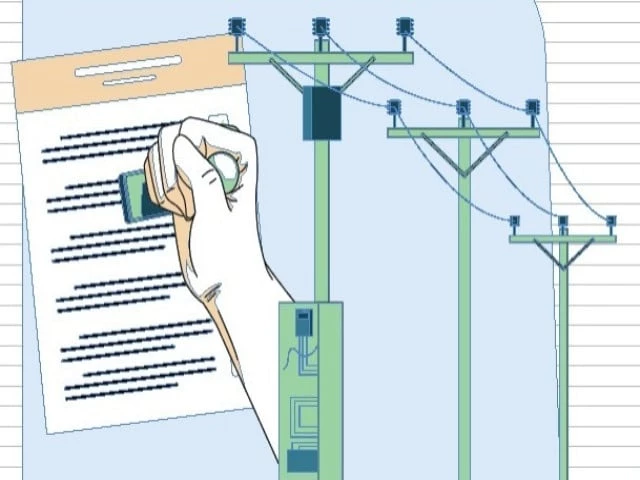7-year tariff plan for KE okayed
NEPRA approves Rs39.97/kWh enabling $2b investment tied to performance

The National Electric Power Regulatory Authority (NEPRA) has approved the seven-year Multi-Year Tariff (MYT) for K-Electric's supply business, covering the period from FY2023-24 to FY2029-30. The decision provides long-term tariff stability and enables K-Electric (KE) to pursue its $2 billion investment plan aimed at improving service quality, reducing losses, and enhancing grid reliability.
As part of the plan, NEPRA has approved KE's average power supply tariff at Rs39.97 per unit under the Multi-Year Tariff for the specified period. Previously, the interim tariff was based on the last MYT and remained effective until March 2023 at a rate of Rs33.82/kWh.
The new MYT aligns KE's supply tariff timeline with those of its generation, transmission, and distribution segments, thereby streamlining regulatory oversight and boosting investor confidence. NEPRA's decision allows KE to recover prudent costs related to fuel, power purchases, transmission and distribution, operations and maintenance (O&M), and working capital, with clearly defined mechanisms for monthly and quarterly adjustments. KE had initially requested a tariff of Rs44.69/kWh, but NEPRA approved Rs39.97/kWh.
A key feature of the decision is NEPRA's acceptance of KE's proposal to recover efficiency losses, using a realistic trajectory for recovery improvements — from 92.76% in FY2024 to 95.48% by FY2030. The authority has also approved the actualisation of sent-out and billed units, to be adjusted annually to reflect economic and operational realities, consistent with the treatment given to other distribution companies (DISCOs). This change is intended to bring KE's supply tariff model in line with the industry's revenue-cap framework.
For its supply business, KE had sought approval for a working capital cost of Rs2.071/kWh, amounting to Rs33.1 billion, based on a total working capital requirement of Rs132.95 billion. KE noted that a large portion of this amount is currently tied up in receivables from government entities, including Tariff Differential Subsidy (TDS) claims, unpaid electricity bills from public sector consumers, and tax refunds. However, these receivables were not included in the current request, as KE is pursuing their resolution separately with the government.
NEPRA approved the calculation of working capital costs using a 3-month KIBOR rate plus a capped spread of 1%, which will be reduced if the actual spread is lower. The approved working capital requirement for FY2023-24 is based on the revised and allowed costs for power purchases, transmission, distribution, and supply margins.
KE stated that it expects sent-out electricity to grow annually at a compound growth rate of 2.6%. This growth will be adjusted based on actual data starting from FY2023, allowing the company to account for any over- or under-recovery of costs. Sent-out units are projected to reach 21,617 GWh by FY2030, up from 18,660 GWh in FY2024.
Distribution charges are estimated at Rs61,385 million, based on a base tariff of Rs3.84/kWh as requested in KE's distribution petition for FY2024 to FY2030. However, NEPRA approved a lower rate of Rs3.31/kWh. KE had also requested transmission charges at Rs2.99/kWh, which have now been linked to the Monthly Demand Index (MDI) as notified by NEPRA.
For Operations & Maintenance (O&M), KE had requested Rs6,758 millionequivalent to Rs0.42/kWhbased on projected billed units for FY2024. After excluding discretionary or non-essential costs, NEPRA approved a total O&M cost of Rs31,963 million for FY2023-24. This includes Rs26,052 million for distribution and Rs5,911 million for supply. NEPRA also noted that KE's actual supply O&M cost of Rs5,911 million was lower than the projected Rs5,926 million based on indexed data from FY2022-23.
NEPRA has instructed KE to ensure an uninterrupted electricity supply and to use recovery-related adjustments responsibly. The regulator will enforce strict performance monitoring, including service quality benchmarks such as the System Average Interruption Frequency Index (SAIFI) and the System Average Interruption Duration Index (SAIDI).
This move marks a significant step toward ensuring a predictable and stable power regime for Karachi and its adjoining areas. It is expected to enhance consumer trust while enabling critical infrastructure upgrades by Pakistan's only vertically integrated private utility.























COMMENTS
Comments are moderated and generally will be posted if they are on-topic and not abusive.
For more information, please see our Comments FAQ